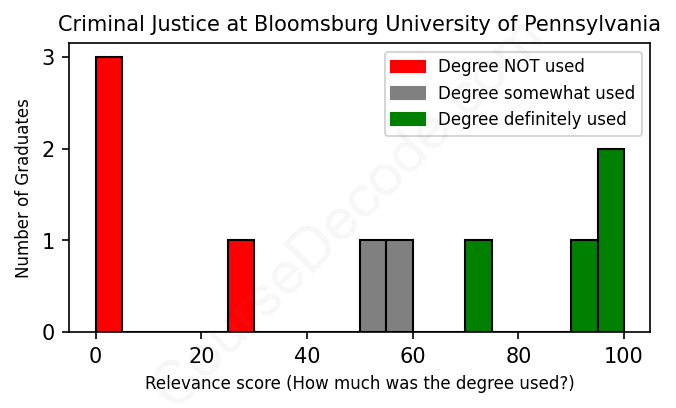
First, some facts. Of the Criminal Justice graduates from Bloomsburg University of Pennsylvania we've analyzed , here's how many have used (or NOT used) their degree in their career:

These are estimates based on AI analysis of 10 LinkedIn profiles (see below).
The verdict? Significantly below average. Overall, with an average relevance score of 49%, Criminal Justice graduates from Bloomsburg University of Pennsylvania have a much lower likelihood (-18%) of finding work in this field compared to the average graduate across all fields:
And for comparison, here's the chart for all profiles we've looked at across all degrees.
Also, after graduating, 40% of these graduates have pursued further education other than another Bachelor's degree (such as a Masters degree or other), compared to the average across all profiles of 35%. This suggests you may need more than just a Bachelors degree to be competitive as a Criminal Justice graduate.
See the details:
|
Relevance score: 0% We think this person has NOT gone into a career related to their degree. We think this person has NOT gone into a career related to their degree.
DEGREE INFOGraduated in 2022 from Bloomsburg University of Pennsylvania with a Bachelor's degree in Criminal Justice. No other secondary education since. JOB HISTORY SINCE GRADUATIONServer/Bartender Yard of Ale Nov 2022 - Apr 2023 ABOUTA graduated criminal justice major college student desiring to take on new challenges and seeking to bring change to the justice system through dedication and self-motivation. Also, bringing in strong communication and people skills. Seeking a position in the criminal justice field, aiming to bring exceptional multitasking and problem-solving abilities to the system. |
The top 10 most common jobs done by the graduates we've analyzed (ranked most common to least) are:
From checking out the LinkedIn profiles of folks who graduated with a Criminal Justice degree from Bloomsburg University, it seems like there are a few standout careers that they tend to pursue. Many graduates go into positions like correctional officers, police officers, or roles within the legal system, like working for the district attorney’s office or as youth care workers. These jobs are cool because they directly relate to the skills and insights gained from their degree, focusing on law enforcement, rehabilitation, and legal advocacy. However, it seems like not everyone sticks closely to criminal justice-related careers. Some graduates end up in totally different fields like sales, customer service, or even hospitality, which don’t require the specialized knowledge their degree offers.
Overall, there’s a mixed bag of outcomes for graduates. While a good number of them are securing jobs that integrate their education—like being correctional or probation officers—there's a significant portion that strays into roles that don't leverage their criminal justice training at all. So, while there are definitely relevant job opportunities stemming from their studies, it’s clear that having a degree in Criminal Justice doesn’t strictly mean you'll wind up in a job that's tied to law enforcement or the legal system. It's all about where your interests lead you, though having a background in criminal justice can still provide useful skills in a variety of careers.
Here is a visual representation of the most common words in job titles for Criminal Justice graduates (this is across all Criminal Justice graduates we've analyzed, not just those who went to Bloomsburg University of Pennsylvania):

It looks like graduates from Bloomsburg University of Pennsylvania with a Criminal Justice degree often start off their careers in positions that are somewhat related to the field, but things tend to get mixed pretty quickly. For instance, those who graduated around 2014 to 2018 often took on roles like correctional officers, case managers, and even police officers right out of school. These entry-level jobs are certainly in the realm of Criminal Justice and show that many of these grads are kicking off their careers in relevant areas. However, as you look further down the line—five to ten years later—you see a significant shift for some. A number of these individuals have moved into roles like sales managers and finance managers, which suggests they might have pivoted away from Criminal Justice altogether.
For some, like those who graduated in 2017, the trajectory is more straightforward, sticking with law enforcement or correctional work. Others, however, have made a beeline into different sectors, like retail and corporate roles, which seem pretty far removed from their Criminal Justice background. On the flip side, there are also graduates who have continued to excel in related fields, like becoming youth detention officers or working with family resources, indicating that some folks have found their niche. Overall, it looks like while many have secured good initial positions related to their degree, the longer-term paths often veer off into other industries that aren't directly tied to Criminal Justice. So, if you're thinking of going into this field, be prepared for a landscape that could shift quite a bit as you gain experience!
Getting a Bachelor’s degree in Criminal Justice at Bloomsburg University can be a mix of challenges and straightforward classes, much like most degrees. Generally, it’s considered to be on the easier side compared to, say, engineering or biology, but it still requires solid effort, especially if you’re not super into the subject matter. You’ll be diving into topics like criminology, law, and ethics, which can be engaging if you’re interested in how the justice system works. Just be prepared for some writing assignments and maybe a few tough exams; overall, if you stay organized and put in the effort, you should be able to handle it pretty well!
Most commonly, in the LinkedIn profiles we've looked at, it takes people 4 years to finish a Bachelor degree in Criminal Justice.
So, looking at these Criminal Justice grads from Bloomsburg University, it seems like their earnings vary quite a bit depending on what paths they chose. The ones working in fields like law enforcement and corrections may not be raking in big bucks right away—like the correction officers, who typically start with modest salaries, though they might have steady job security. On the flip side, the grad who's really climbing the corporate ladder in sales and business development seems to be killing it with some serious promotions and pay jumps. Unfortunately, some of the more recent grads are still finding their footing, with roles like server or customer service which don’t pay as well. Overall, while some are definitely making decent money, others might still be in that early-career struggle phase.
Here is a visual representation of the most common words seen in the "about" section of LinkedIn profiles who have a Bachelor degree in Criminal Justice (this is across all Criminal Justice graduates we've analyzed, not just those who went to Bloomsburg University of Pennsylvania). This may or may not be useful:

Here are all colleges offering a Bachelor degree in Criminal Justice (ordered by the average relevance score of their Criminal Justice graduates, best to worst) where we have analyzed at least 10 of their graduates: